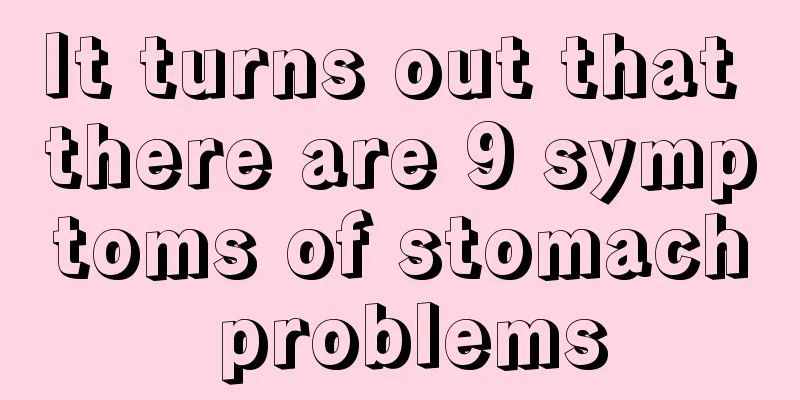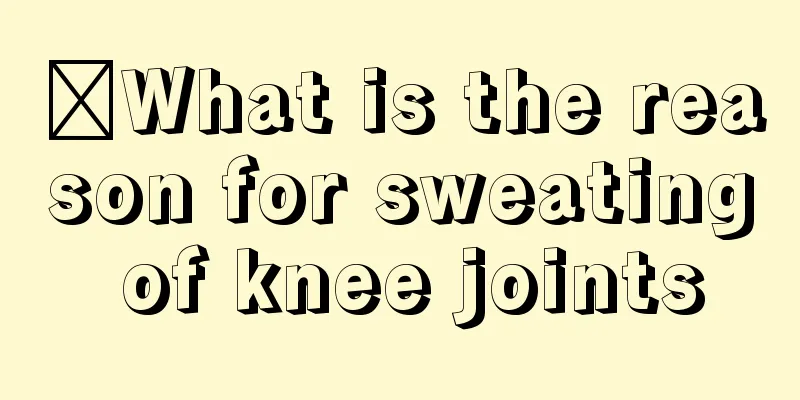It turns out that there are 9 symptoms of stomach problems

|
Gastric disease is a relatively common disease in daily life and has a great impact on human health. Therefore, we must detect and treat gastric disease early to avoid missing the best treatment time and causing ourselves to fall into more serious illness. So what are the symptoms of stomach problems? In fact, there are 9 symptoms of stomach disease, and abdominal distension and pain after meals is one of them. Symptoms of stomach problems 1. Abdominal distension and pain after meals, often accompanied by nausea, vomiting, and occasional vomiting of blood. A history of stomach disease that has recently worsened, or no history of stomach disease that has only recently developed, accompanied by anemia, weight loss, loss of appetite, and a hard lump felt above the navel or heart, then stomach cancer is considered. 2. Abdominal pain and diarrhea after eating improperly or catching a cold, which may be accompanied by vomiting, chills and fever, may be acute gastroenteritis or acute dysentery. 3. Diarrhea occurs immediately after meals, after each meal, when slightly cold or eating improperly, diarrhea occurs sometimes and constipation occurs sometimes, the diarrhea is watery, and there is a lot of mucus when constipated. Sometimes the abdomen is bloated and there is a urge to defecate but no stool is produced when going to the toilet, and there is no weight loss for several years. It is very likely that you have chronic allergic enteritis. 4. Diarrhea will occur after eating spicy, greasy, or cold food, drinking alcohol, or right after a meal. Some people may have abdominal pain and intestinal rumbling during or before diarrhea, and the abdominal pain will be relieved after diarrhea. This may be due to intestinal dysfunction. 5. If you experience bloating and pain in the right upper abdomen and radiate to the right shoulder after eating greasy food, you may be suffering from cholecystitis or cholelithiasis. People who like to eat greasy food, are obese, or skip breakfast should pay more attention. 6. If you experience heartburn, belching, or pain behind the sternum after a meal (which is more obvious when lying flat or bending forward or when abdominal pressure increases), you should consider gastroesophageal reflux disease. 7. There is a feeling of obstruction, pause, or pain behind the sternum when eating, and the pain may be mild or severe. This often suggests that the patient may have esophagitis, esophageal diverticulum or early esophageal cancer. 8. Feeling bloated after meals or all day long, belching but no acid reflux, poor appetite, gradual weight loss, and slightly pale or gray complexion. Middle-aged and elderly people should consider chronic gastritis, especially chronic atrophic gastritis and gastroptosis. 9. Upper abdominal pain after meals, or nausea, vomiting, or a feeling of indigestion. Symptoms persist for many years, often occurring in autumn. The pain may be rhythmic, such as after catching a cold, getting angry, or eating irritating foods. This may be a gastric ulcer. |
<<: Who is not suitable for traction for lumbar disc herniation
>>: Does Chinese rhubarb help with diabetes?
Recommend
Eat healthy! Stay away from prostate cancer
Experts believe that: At present, prevention ofte...
How to cut cantaloupe quickly
When eating Hami melon, you should not only consi...
Why is the tip of my nose red and itchy?
The skin on the face needs careful care to be in ...
How to dye nails with Impatiens?
Impatiens, also known as henna and henna, is a co...
Will blood vessel obstruction cause arterial symptoms?
Vascular obstruction is more common in middle-age...
How to prevent uremia?
As we all know, uremia is a common kidney disease...
Experts analyze factors related to the causes of colorectal cancer
Intestinal cancer is a malignant tumor with a rel...
Can almonds and yogurt be eaten together
The almonds we eat are generally processed. For e...
What tests are helpful in diagnosing lung cancer? These tests are needed to diagnose lung cancer
Lung cancer is a highly malignant tumor disease, ...
Bone cancer patients often experience some limb pain
Bone cancer patients often experience some limb p...
Symptoms of prostate cancer liver metastasis
It is very scary for male friends to suffer from ...
The efficacy and function of mint tea
Mint leaf is a common Chinese medicine. It has a ...
Can pressing the back of the hand cure cervical spondylosis?
Cervical spondylosis is also known as cervical jo...
Can brain cancer be cured if it doesn't spread?
Brain tumors are tumors that grow inside the skul...
What happens if you eat spicy food while taking Chinese medicine
Doctors usually advise you not to eat spicy or co...









